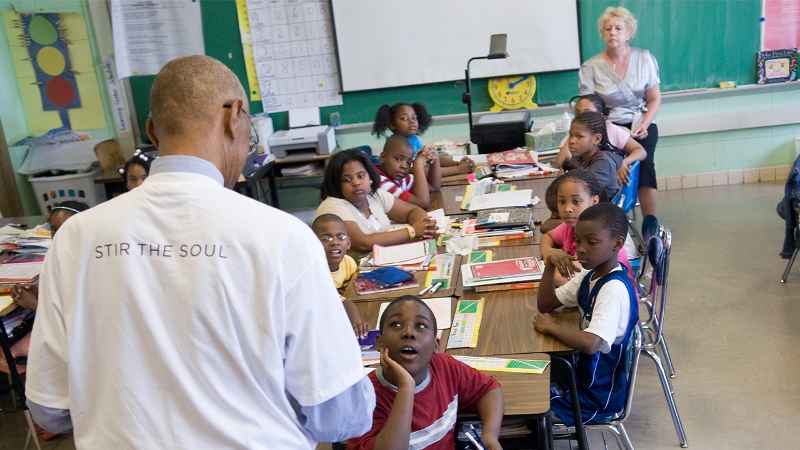Enroll in Primary Science Tuition Singapore for a Strong Science Foundation
Enroll in Primary Science Tuition Singapore for a Strong Science Foundation
Blog Article
A Comprehensive Overview to the Various Understanding Techniques in Key Science Instruction
The exploration of diverse learning approaches in main science instruction presents a chance for instructors to improve trainee engagement and understanding dramatically. By taking a look at hands-on knowing techniques, inquiry-based strategies, and joint approaches, we can determine effective techniques that cater to numerous discovering styles.

Hands-On Knowing Methods
Hands-on discovering strategies play a pivotal role in primary science direction, engaging trainees in active exploration and experimentation. These techniques enable students to engage straight with products and phenomena, promoting a deeper understanding of scientific ideas. By utilizing manipulatives, designs, and real-life experiments, teachers produce an atmosphere where students can observe, hypothesize, and test their ideas.
Such strategies not just boost understanding yet additionally grow essential thinking and analytical skills. When students participate in activities like building simple machines, growing seeds, or performing chemical responses, they are urged to ask inquiries and look for answers via their own monitorings. This experiential approach assists to demystify intricate scientific principles, making them extra relatable and easily accessible.
In addition, hands-on discovering promotes collaboration among peers, as pupils commonly function in groups to perform experiments or share findings. This teamwork not just improves their discovering experience but additionally establishes vital social skills. Inevitably, integrating hands-on strategies in main scientific research direction promotes a lifelong love of discovering and curiosity concerning the environment, laying a strong structure for future academic searches in science and beyond.
Inquiry-Based Learning
Inquiry-based understanding is a training strategy that encourages pupils to ask questions, check out phenomena, and build their very own understanding of scientific concepts. This technique changes the focus from typical teacher-led direction to an extra student-centered experience, where learners take the effort in their instructional journey. By promoting inquisitiveness, inquiry-based learning advertises much deeper engagement with the product, permitting students to check out subjects in a meaningful context.
In method, this technique often involves hands-on experiments, observations, and vital reasoning activities that align carefully with the clinical approach. Students are encouraged to develop theories, layout investigations, and evaluate information, which grows crucial skills such as logical and analytic reasoning. The function of the instructor in this structure is to facilitate exploration, guiding students with the query procedure while motivating independent idea and collaboration.
Furthermore, inquiry-based knowing nurtures a sense of ownership over the knowing process, inspiring trainees to go after understanding actively. This technique not only improves understanding of clinical ideas however likewise promotes a lifelong love for knowing, gearing up students with the abilities needed to browse a significantly complicated world.
Collaborative Knowing Approaches
Collective learning strategies encourage trainees to participate in purposeful communications with peers, cultivating a shared duty for their instructional outcomes. In key scientific research guideline, these approaches motivate students to collaborate to check out scientific principles, resolve problems, and carry out experiments (primary science tuition Singapore). By joining team activities, trainees can leverage varied perspectives, permitting richer understanding and retention of scientific expertise
One key facet of collaborative discovering is the emphasis on interaction skills. Pupils should express their thoughts, pay attention proactively to others, and work out concepts, all of which are important competencies in both real-world and scholastic contexts. This social communication not only boosts their understanding of scientific principles yet additionally advertises teamwork and dispute resolution skills.
Furthermore, collaborative discovering often brings about raised inspiration and interaction. They are a lot more most likely to take possession of their discovering trip when pupils see the worth of their contributions within a team. Teachers can facilitate this process deliberately structured team jobs that straighten with educational program goals while giving assistance on effective cooperation methods. Overall, integrating collective discovering methods in primary scientific research guideline cultivates a vibrant understanding atmosphere that prepares pupils for future scholastic and social obstacles.
Modern Technology Combination in Science
The integration of technology in key scientific research instruction boosts finding out experiences by supplying innovative devices and sources that support various training methods, including collaborative understanding - primary science tuition Singapore. Making use of digital systems, simulations, and interactive applications permits trainees to involve deeply with clinical concepts, helping with a more hands-on strategy to discovering
Virtual research laboratories, as an example, enable students to carry out experiments safely and successfully, promoting inquiry-based understanding. These tools can simulate real-world clinical scenarios, permitting students to envision complex processes that would be challenging to replicate in a typical classroom setting. Modern technology cultivates communication and collaboration amongst site link students, as they can share searchings for and work with each other on tasks via on the internet systems.
Additionally, multimedia discussions and instructional videos can enhance lessons by dealing with diverse knowing designs, making abstract principles more obtainable. Data evaluation devices additionally empower trainees to accumulate and analyze scientific data, strengthening essential thinking skills. Generally, the critical incorporation of innovation in key scientific other research guideline not only enhances engagement however additionally prepares trainees for a highly advanced culture, equipping them with necessary skills for future scientific ventures.
Set Apart Instruction Strategies
Distinguished instruction techniques are vital for attending to the varied requirements of students in main science education. These techniques enable educators to tailor their training approaches to suit differing capabilities, passions, and finding out designs within the classroom. By employing differentiated instruction, educators can develop a comprehensive atmosphere that fosters engagement and boosts understanding of clinical concepts.
One reliable method is to use flexible grouping, which permits trainees to collaborate with peers at comparable skill levels or with varying viewpoints. This strategy motivates peer knowing and promotes important thinking. In addition, using choices in jobs can equip pupils, enabling them to select tasks that resonate with their passions while still satisfying curricular objectives.
Additionally, incorporating tiered jobs is one more beneficial method. Deliberately jobs with varying degrees of complexity, instructors can make sure that all students are suitably challenged, despite their proficiency. Making use of formative analyses to evaluate recognizing additional enables instructors to readjust their instructional techniques dynamically, ensuring that each student obtains the support they require.
Inevitably, executing set apart instruction approaches in main scientific research education and learning not only boosts student knowing end results but likewise grows an interest for science, preparing trainees for future scholastic quests.

Final Thought
In summary, efficient main scientific research instruction requires a complex method that includes hands-on discovering, inquiry-based methods, and collective techniques. The combination of modern technology and distinguished guideline further deals with diverse understanding designs, promoting a setting favorable to exploration and vital reasoning. By carrying out these important source strategies, instructors can enhance pupil engagement and comprehension, inevitably supporting a lifelong interest for science and questions. Such extensive techniques are vital for developing notified and interested future scientists.
The exploration of diverse discovering approaches in primary science direction provides a possibility for instructors to enhance student engagement and comprehension substantially.Hands-on understanding techniques play a pivotal role in main science direction, involving trainees in energetic expedition and trial and error.Inquiry-based understanding is an instructional approach that encourages students to ask questions, examine phenomena, and construct their own understanding of scientific concepts.Collaborative knowing methods empower students to engage in significant interactions with peers, promoting a shared obligation for their academic outcomes. In general, integrating collective discovering techniques in main science instruction cultivates a dynamic learning setting that prepares students for future academic and social obstacles.
Report this page